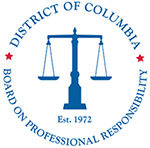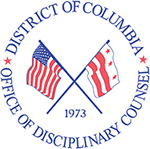- For the Public
- For Lawyers
- Board on Professional Responsibility
- Office of Disciplinary Counsel
- Disciplinary Decisions
-
Attorney Discipline News
- Administrative Order 2020-8: Live Streams of Hearing Committee Proceedings
- Administrative Order 2023-1: Return to In-Person Proceedings
- The Court of Appeals Makes Appointments to the Board on Professional Responsibility
- Amendments to the Rules of the Board on Professional Responsibility
- Amendments to the Rules of the Board on Professional Responsibility
- Volunteer Opportunities
From Washington Lawyer, April 2013
By Gene Shipp
The Office of Bar Counsel (OBC) turns 40 years old on April 1. Yes, it is April Fool’s Day. I think Fred Grabowsky, the first full-time bar counsel, had a sense of humor. I thought we would take a moment and look back at what we have seen over the last 40 years.
Now, the disclaimer: No, I have not been with OBC for 40 years, but I was admitted to the D.C. Bar 40 years and four months ago in the first class of admittees who took the bar exam administered by the Committee on Admissions for the District of Columbia Court of Appeals (Court). I first met Fred Grabowsky some 42 years ago (while a law student) working as a defense investigator, when I agreed to investigate a capital murder case in which Fred was one of the defense attorneys. I also acted as respondent’s counsel in one matter before I joined OBC. I have worked at OBC for over 32 years. So, given that background, here are my observations.
Creation: OBC, the prosecutorial arm of the discipline system, was established by the Court close in time to the creation of the D.C. Bar. OBC is responsible to and supervised by the Board on Professional Responsibility (Board) as well as the Court. The Board is composed of nine members (seven attorneys and two public members) who are appointed by the Court. OBC staff is hired by the Board and may not engage in the practice of law outside of the office.
Staff: OBC has had 7 bar counsel over the past 40 years. The longest–serving was Fred, with 10 years as bar counsel. I have held the job for more than 8 years. We have had 3 deputies in those 40 years, with Elizabeth “Betsy” Herman holding that position for the last 7 years. (Betsy has been with the office for over 28 years.)
We presently employ 17 lawyers (most have been with the office for more than 10 years and been in practice for at least 20 years), 3 investigators (2 former FBI agents with accounting backgrounds and 1 attorney investigator), as well as 12 administrative staff and 2 law clerks.
Jurisdiction: OBC has jurisdiction over the 98,743 members of the D.C. Bar. When I was admitted in 1973, there were approximately 14,000 members.
Funding: Yes, your mandatory bar dues support the discipline system. In fiscal year 1983–84, the first year I served as deputy, the discipline system received $25.07 per member (55.7 percent of dues). In fiscal year 2012–13, the discipline system received $79.48 per member (31.7 percent of dues).
Mandate:
- Protect the Public From Unethical Behavior by a Member of the Bar
- Protect the Integrity of the Courts and the Bar
- Protect Members of the Bar from Unfounded Complaints
What We Have Seen and Continue to See:
Reciprocal discipline is a big part of matters that result in discipline. While a lot of state discipline systems may process 10 or fewer reciprocal cases per year, we usually handle more than 50 cases a year. Since most attorneys do not self-report, despite the rule requiring them to do so, we have learned over the years how to detect these unreported disciplines by our sister jurisdictions.
Neglect of a legal matter entrusted has been the number one complaint since our doors opened. Failing to return phone calls (e–mail, nowadays), failing to attend to a legal matter, failing to return the file, etc. will always be the predominant complaint. Lots of education and training are focused on the human conditions that cause avoidance syndromes. We also highly recommend the course, “Basic Training and Beyond: How to Start a Law Firm,” which is conducted by Daniel M. Mills and Rochelle Washington of the Bar’s Practice Management Advisory Service. The course benefits young lawyers, attorneys leaving government service, or attorneys in small firms or solo practice. It is comprehensive, practical, and free.
Dishonesty is always the number two complaint. It often involves what I call a gumball lie (white lie). It just rolls out of your mouth in a moment of embarrassment or when you have that trapped feeling. Guard against it by understanding that the truth is not only critical but required. Most people appreciate the candor.
Misappropriation of client funds was a huge problem when I came to OBC. Lawyers often thought that as long as they returned the money, borrowing it was ok. We now see these cases less frequently, and it may be because most of us have learned that misappropriation is the quickest way to be disbarred.[1] I have had the pleasure of speaking before 40,000 of you at the Mandatory Course on the D.C. Rules of Professional Conduct and District of Columbia Practice at which I have tried to clearly say do not touch your client’s funds. The Court has made it clear that if you cannot trust your lawyer with your money, who can you trust? I will celebrate the year when no attorney engages in this conduct worthy of disbarment.
Self–regulation is a huge responsibility for the profession. We need to do it very well and be constantly vigilant in a changing world that causes us to revisit our Rules of Professional Conduct. Rule 1.6 (Confidentiality/Secret Responsibilities) is one rule that has evolved in the last 40 years as we constantly reevaluate our responsibility to our clients vs. our responsibilities to the public. Enron and its fallout is an example that has affected our view of our mixed responsibilities.
It is clear to me that most core values never change. My short version of those rules is that lying, cheating, stealing, and/or neglect will never be acceptable.
Let me thank all the volunteers who have served on the Board and the Hearing Committees, as well as the practice monitors and committee members studying the ethics rules and the discipline system. Also, thanks to all the past and present employees of our OBC and the Board offices who served over the last 40 years. Finally, my personal thanks to our Court of Appeals who created our office and constantly works to safeguard our profession. It is my hope that self–regulation can be retained by our profession, and the public’s confidence in lawyers will continue to be well earned and protected.
At my interview 32 years ago, when Fred Grabowsky offered me the job, he said he required a three–year commitment. I answered in an off–handed way, “I will stay until I get it right.”
So, here I am, g.
Note
[1] In re Addams 579A.2d190, 191 (DC 1990) (en banc)
Disciplinary Actions Taken by the Board on Professional Responsibility
Original Matters
In re Edward N. Matisik. Bar No. 463786. January 24, 2013. The Board on Professional Responsibility recommends that the D.C. Court of Appeals suspend Matisik for 60 days, that he be required to demonstrate his fitness to practice law as a condition of reinstatement, and that he be required to make restitution in the amount of $1,940, plus interest at the legal rate of 6 percent. While retained to represent clients in three matters involving three separate clients, Matisik failed to provide competent representation and to serve the clients with skill and care, failed to represent the clients zealously and diligently and to act with reasonable promptness, failed to communicate with the clients and keep them reasonably informed, failed to communicate in writing the basis or rate of the legal fee, failed to withdraw from representation when impaired, and failed to return papers and property after termination of representation. Rules 1.1(a), 1.1(b), 1.3(a), 1.3(c), 1.4(a), 1.5(b), 1.16(a)(2), and 1.16(d).
In re Lennox J. Simon. Bar No. 426360. January 30, 2013. The Board on Professional Responsibility recommends that the D.C. Court of Appeals disbar Simon. While serving as a court–appointed conservator of the estate of an incapacitated individual, Simon engaged in reckless misappropriation of funds entrusted to him. Rules 1.1(b), 1.3(a), 1.3(c), 1.15(a), and 8.4(d).
The Office of Disciplinary Counsel compiled the foregoing summaries of disciplinary actions. Informal Admonitions issued by Disciplinary Counsel and Reports and Recommendations issued by the Board on Professional Responsibility are posted at www.dcattorneydiscipline.org. Most board recommendations as to discipline are not final until considered by the court. Court opinions are printed in the Atlantic Reporter and also are available online for decisions issued since August 1998. To obtain a copy of a recent slip opinion, visit www.dccourts.gov/internet/opinionlocator.jsf.
- For the Public
- For Lawyers
- Board on Professional Responsibility
- Office of Disciplinary Counsel
- Disciplinary Decisions
-
Attorney Discipline News
- Administrative Order 2020-8: Live Streams of Hearing Committee Proceedings
- Administrative Order 2023-1: Return to In-Person Proceedings
- The Court of Appeals Makes Appointments to the Board on Professional Responsibility
- Amendments to the Rules of the Board on Professional Responsibility
- Amendments to the Rules of the Board on Professional Responsibility
- Volunteer Opportunities

- Board on Professional Responsibility
- 430 E Street NW
- Suite 138
- Washington, DC 20001
- Phone: 202-638-4290
- Fax:

- Office of Disciplinary Counsel
- District of Columbia Court of Appeals
- 515 5th Street, NW
- Building A, Suite 117, Washington, DC 20001
- Phone: 202-638-1501
- Fax: 202-638-0862

